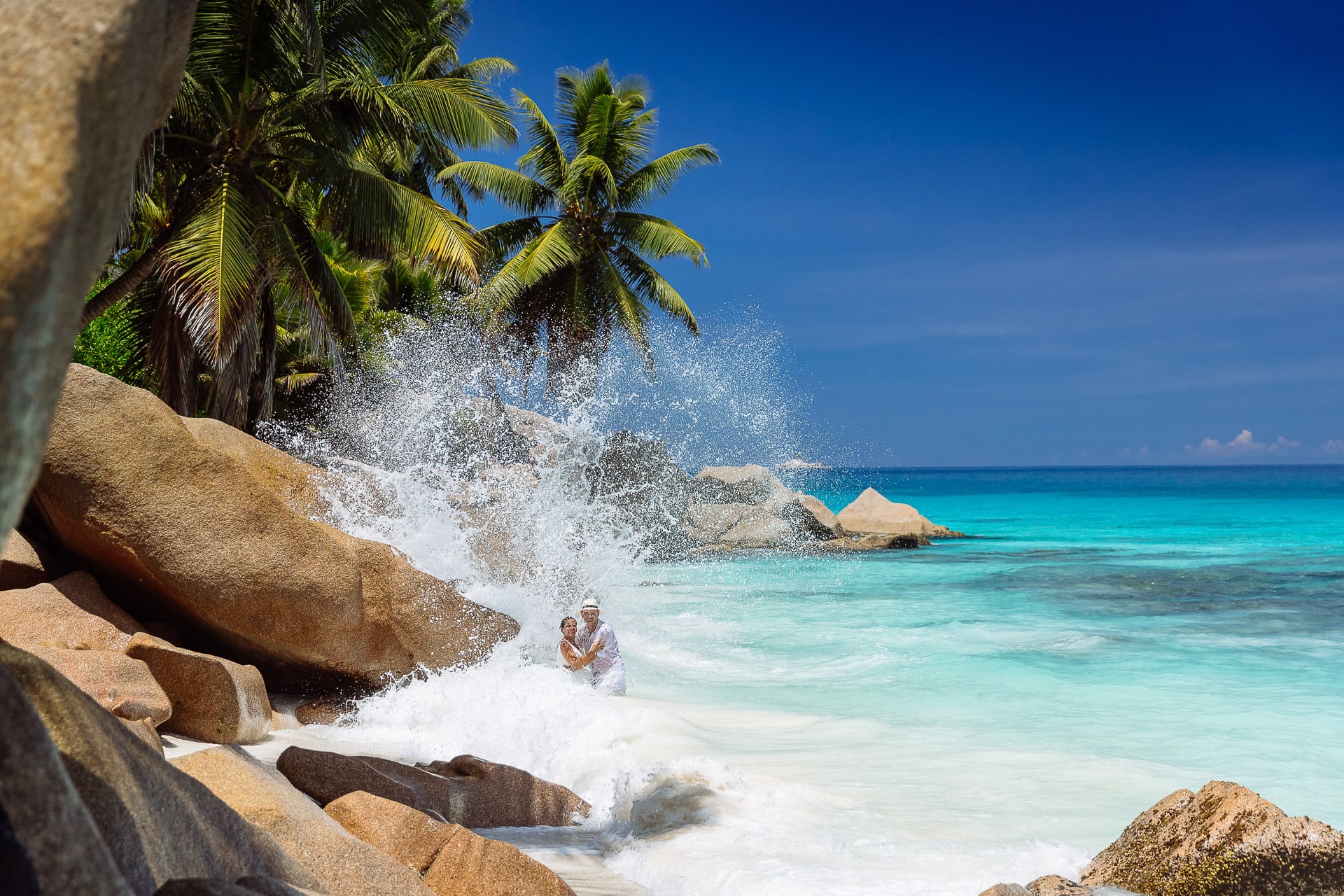Marriage abroad
Things to know about getting married abroad
Wedding and marriage abroad
More and more couples are deciding to get married abroad. There are many reasons for this. Some of the couples I have accompanied to their weddings abroad have given me the following reasons, among others:
“A wedding reception in a castle or a rented hall was out of the question for us. Here in the Seychelles, it was totally easy to organize our wedding with Torsten as our wedding planner and photographer! Probably nowhere else in the world is the bureaucratic part with the necessary wedding papers as uncomplicated as in the Seychelles. That’s why it quickly became clear to us that we would get married here on the beach.” (Tatjana, wedding in the Seychelles)
“We don’t fancy a formal party with 100 guests, to which I would even have to invite my boss, who I can’t stand anyway!” (Anonymous, wedding on Mallorca)
“A suit and tie are not my thing at all. Standing on the beach in flip flops during the ceremony – that suits us perfectly!” (Jan, wedding in the Seychelles)

“At all the weddings we were invited to in Germany, we noticed that someone from the bride’s or groom’s family always had something to complain about. The beer was too warm, the wine too cold, the music too loud and the waiter too slow. We were simply not in the mood for such nagging! So the two of us went to paradise and got married there intimately just for us and discovered what is probably the most beautiful country in the world. We will definitely be back! It was simply beautiful and the best decision of our lives!” (Silvia, wedding in the Seychelles)
“The couple can’t really enjoy a wedding at home. You want to please every guest as much as possible and therefore inevitably have to make compromises again and again. We also noticed how some couples argued, sometimes violently, in the last few weeks before the big wedding celebration. The closer the big day got, the more frayed their nerves became. Sorry, but we just didn’t want that.” (Barbara, wedding in the Seychelles)
“Organizing a wedding is more work than most people think. It seems so easy, but it often isn’t. And after I saw a bride sitting in the corner crying at her “dream wedding” on a totally rainy summer day here in Austria, it was clear to me that I definitely didn’t want to get married like that. So the two of us went to the Seychelles, booked Torsten as our photographer and wedding organizer and had the best time of our lives!” (Pia, wedding in the Seychelles)
“Our wedding is supposed to be so different from the weddings of friends who got married back home in Germany. Somehow every wedding there is largely the same.” (Stefan, wedding in the Seychelles)
“We just wanted to celebrate the best day of our lives as a couple. It was the perfect decision for us!” (Cindy, wedding in Mauritius)

“As the bride is from Rio de Janeiro and her large family lives there, we are getting married right by the Sugar Loaf Mountain. Pleasant temperatures guaranteed!” (Aike, wedding in Brazil)
“We simply wanted to escape the ‘typical German wedding hustle and bustle’ and just enjoy our wedding with our favorite friends on our favorite island!” (Sabrina, wedding in the Seychelles)
“It was always clear to me that one day I would get married on the most beautiful beach in the world. It was an absolute dream!” (Carmen, wedding in the Seychelles)
As you can see, there are plenty of arguments in favor of a wedding abroad. In the Seychelles, it is also particularly easy for couples from Europe to get married – because the bureaucratic hurdles are not worth mentioning. A copy of your passport, an international copy of your birth certificate (can be obtained from the registry office in your place of birth; can be applied for online in many cases) and – if one of you has already been married – the so-called certificate of no impediment to marriage (can be obtained from the registry office in your current place of residence) or alternatively the divorce decree (must be available in English translation). That’s it for the “paperwork”.
Incidentally, you do not need a separate visa. If you would like to travel to the Seychelles, you must submit your digital entry application before you travel. You can find the corresponding online form in German here:
https://seychelles.govtas.com/en/ta?cc=DEU
The form can be completed from 30 days before your arrival in the Seychelles. However, I recommend that you “play through” this entry application form much earlier to see what you need to have ready before you start your journey. This will give you enough time to get any missing items at your leisure.

